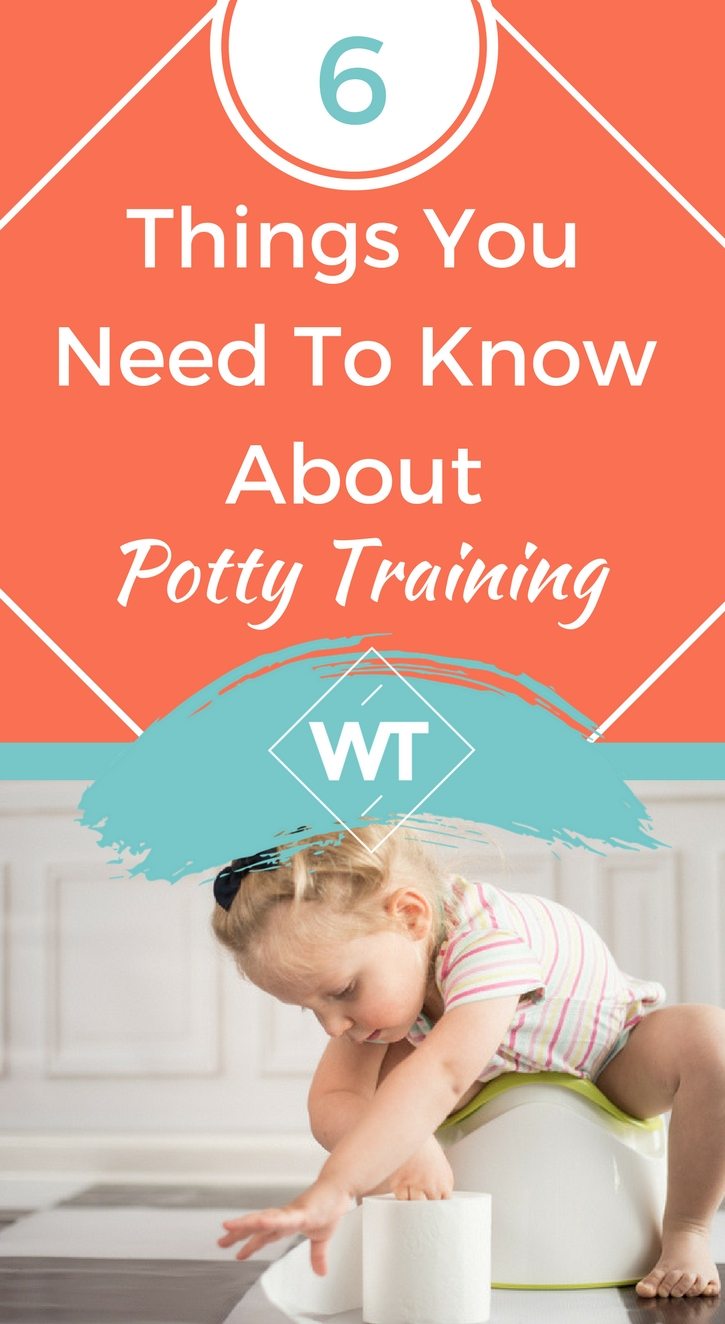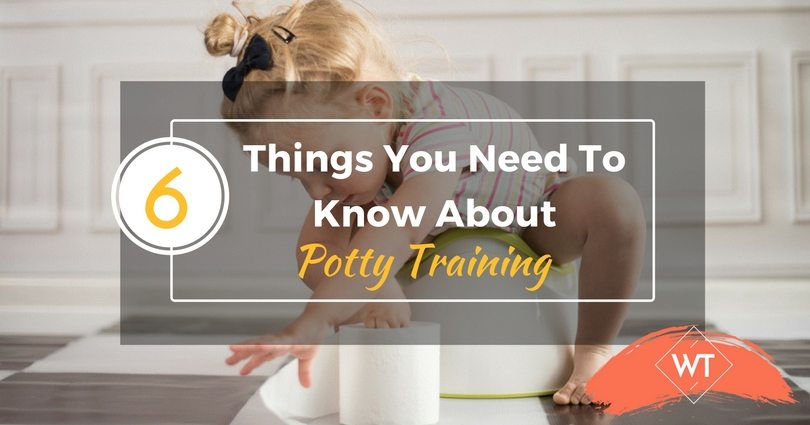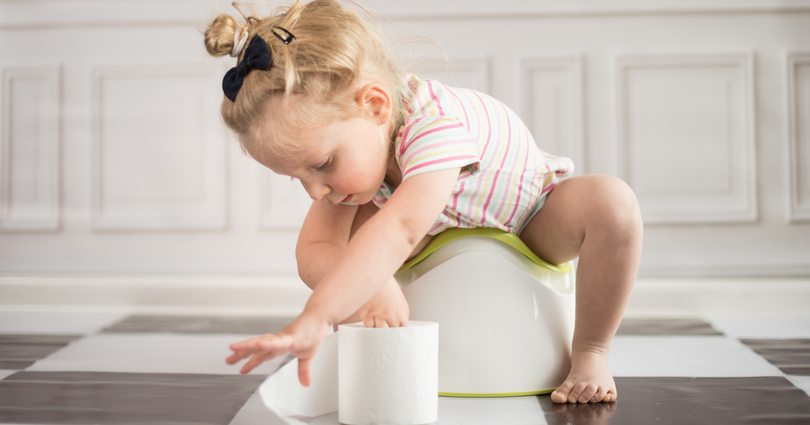6 Things You Need To Know About Potty Training

You can lead a toddler to potty, but you can’t make him pee. ~ Anonymous (Tweet this)
Potty training is one of those milestones parents hear a lot about! A lot of opinions, a lot of advice (wanted and unwanted), and a lot of expert information that seems to get tangled up and adds to the anxiety of trying to do it right. As a first-time mother of an 18-month-old baby, I know the scenario very well. Potty training doesn’t seem to be something that just happens if you let it be, like walking or saying their first words, it even has the word “Training” in it!
So you feel the pressure, you want to be the best potty training coach in the world but have no idea where to start. I feel your pain. I was there, and to alleviate the stress I did what any parent in doubt would do; I researched the heck out of the subject, and now I am sharing my findings with all the other desperate parents in need of answers.
Typical Potty Training Questions
The very first question is almost always: when? How young is too young to start potty training? The answer from most pediatricians seems to be the same. They agree that generally speaking, babies might be ready physiologically around the 18-month mark, but psychologically not so until past 2 years of age.
There are some techniques that start getting the babies ready much earlier (for example one known as “Elimination Communication” but this is a very different method in which diapers are left out of the picture much earlier and sometimes they aren’t even used at all). It is an interesting take but it takes longer and it requires more involvement than the more conventional potty training methods. I do not want to oversimplify it so I will give it its own space in a different section.
In earlier generations the tendency was to hurry the children to begin potty training as soon as possible. This was due to the difficulties and expenses that having a baby in diapers brought. Not long ago disposable diapers were not that readily available and cleaning and disinfecting the cloth ones was much harder.
Even today with all the advancements the thought of getting rid of them early is so enticing, but we should always have the child in mind first and wait until they are ready. Otherwise, we’ll face a much harder task and a much more stressful time for all parties involved.
Is your child ready?
Some of the signs that let us know that the child is ready to start potty training are:
- He is already able to move about on his own.
- Has some of the motor skills necessary to pull his pants down, sit on the potty, etc.
- He recognizes himself (capable of understanding concepts such as me, mine, his body parts, etc.)
- He starts to hide, signal, or tell you when he is going to go. He shows that he is conscious of what is happening and not just doing it without paying much attention.
If your child is already showing these signs, then they are ready to start potty training (independent of their age). It is believed, for example, that girls are ready earlier than boys, but each child will have their own pace. This is normal and it is important that you do not put unnecessary pressure on it. Things will flow better—literally—if you wait for the right moment. As an added side-benefit of potty training this way, the transitions from diapers to potty will be a faster and happier one.
6 key tips for parents
From all the research the number one of all potty training tips I found was precisely “wait until they are ready” so do not try to skip this one—ever! But once you are ready to move on, here is more useful advice for you to be ready for “duty:”
- Get them used to the idea of the potty. Take them to the bathroom with you, or with their older sibling, so they can see that it is something everybody does and nothing to be afraid of. Talk them through the steps—sitting, going, wiping, washing hands and all. Sit them on the potty, even with the diaper on at the beginning if that keeps them calmer.
- Ditch the diapers. I know those pull-ups are tempting. They catch accidents and they are still so easy to use when you need to make a run for the potty. But both seasoned parents and experts agree that if you want to be more efficient with the potty training, the baby needs to experience that not making it to the potty is not pleasant. The diapers get in the way of this so leave them only for naps and nighttime.
- Get the appropriate tools. Having the appropriate gear can help reduce training time considerably. The right potty, for example, can eliminate anxiety, get them motivated, and eliminate the fear of falling into the toilet. There are lots to choose from, some even play music or have their favorite characters! You can also let them pick out their new big-kid underwear! It can become an incentive to keep them dry.
- Catch the opportunities. Be very observant. Learn what signals you can pick up that indicate your child is about to go. Take them to the potty right after they wake up, or any moment you suspect it could be an opportunity. It does not matter if nothing happens, reward the effort and keep trying.
- Praise, and use positive reinforcement only. Always praise for the effort. Make a big deal when they actually make it on target. Have a special song, or a story to keep them interested while waiting and also that you can use to celebrate the victories. When it happens you won’t have to fake it. You are going to want to dance! But never, ever punish accidents! They will happen and they should be treated very matter-of-factly to avoid creating anxiety.
- Have Patience. Even after they are consistently going to the potty there is going to be some point at which accidents might occur and the kids will need our guidance and support. Just like we wouldn’t get upset at our babies for falling when they start walking, we should not expect utter perfection when they are starting to master the potty. Experts suggest that the average time for children to be completely finished with potty training tends to be around 3 months (from readiness to complete mastery).
Parenting is far from an exact science. We are all trying our best and we are all learning as we go, (even after a couple of kids), because we are all unique, and that is a beautiful thing. With these potty training tips, I hope to have helped illuminate (a bit) the path to follow when you are ready to jump into this new adventure of learning together.
You can learn many things from your children. How much patience you have for instance. ~ Franklin P. Jones (Tweet this)
Do you have any pointers about potty training that would be helpful for other parents? Please let us know in the comments. As the saying goes, it takes a village! And today our village is often a virtual one.









Leave a Reply